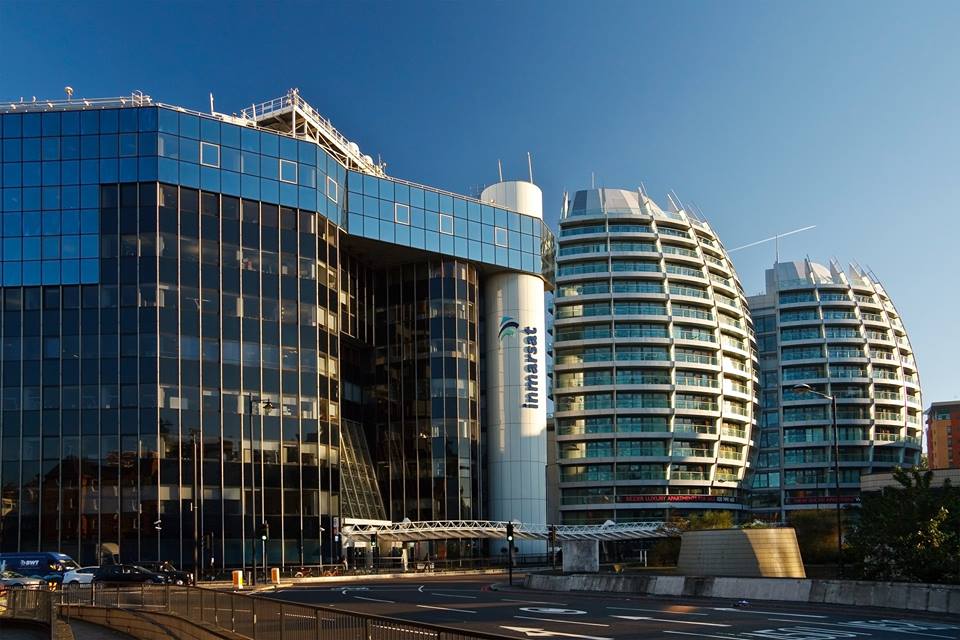TAMPA, Fla. — Viasat has agreed to buy British satellite fleet operator Inmarsat in a $7.3 billion deal to expand its broadband network globally in multiple orbits and spectrum bands.
Buying private equity-backed Inmarsat would transform U.S.-based Viasat into an operator of 19 satellites across Ka, L and S-band spectrum — with another 10 spacecraft set to launch in the next three years for a market that has been shaken up by SpaceX’s Starlink and other incoming megaconstellations.
“The unique fusion of teams, technologies and resources provides the ingredients and scale needed for profitable growth through the creation and delivery of innovative broadband and IoT services in new and existing fast-growing segments and geographies,” Viasat executive chair Mark Dankberg said in a statement.
“Inmarsat’s dual-band global mobile network, unique L-band resources, skills and capabilities in the U.K. and excellent technical and operational talent worldwide, are powerful complements to Viasat’s business.”
Merging their satellites and spectrum assets into a hybrid space and terrestrial network positions the combined company for a transforming industry, Inmarsat CEO Rajeev Suri said during a conference call.
“It’s clear the satellite communications sector is entering an era of dynamic new market demand that is growing fast, remains highly fragmented and is attracting new entrants who see new opportunities,” Suri said.
“Given these factors, scale and scope are important, and that is exactly what this transition offers.”
The boards of both companies unanimously approved the transaction. The Baupost Group, which is publicly listed Viasat’s largest shareholder, has also given its approval.
Viasat expects to close the acquisition in the second half of next year after getting the approval of other shareholders, in addition to regulatory clearances.
The deal comprises $850 million in cash, about $3.1 billion in Viasat equity and the assumption of $3.4 billion of net debt.
Inmarsat’s private equity owners, a consortium led by Apax and Warburg Pincus which bought the British company in 2020, would take about 37.5% of the combined group.
Viasat said it had obtained commitments for $2.3 billion in new debt to finance the deal.
Industry transformation
The transformative acquisition comes as SpaceX prepares to launch Viasat’s first high-capacity Ka-band ViaSat-3 satellite to geostationary orbit (GEO), using a Falcon Heavy rocket in the first half of next year.
The first ViaSat-3 aims to cover the Americas with significantly faster broadband speeds than the rest of Viasat’s fleet, to be followed by another ViaSat-3 targeting Europe six months later and then a third for Asia to globalize the U.S.-based company’s services for the first time.
Inmarsat already provides worldwide connectivity services with 14 satellites in orbit, giving Viasat points of presence and distribution channels to support its international expansion plans.
The British company also has seven more satellites under construction, five in GEO and two in highly elliptical orbit (HEO).
In July, Inmarsat unveiled plans to add at least 150 low Earth orbit (LEO) satellites to a multi-orbit constellation it calls Orchestra.
Those plans include investing $100 million over the next five years as it prepares to deploy 150-175 LEO spacecraft from 2026.
Dankberg said on the conference call that the Ka-band satellites Inmarsat has under construction would add redundancy for Viasat’s fleet, noting that several of the spacecraft the U.K.-headquartered group has ordered feature software-defined payloads, meaning they can be reprogrammed in orbit if needed.
“One of the really attractive things about this combination is … the satellite systems are essentially interoperable,” he said.
“We both use Ka-band, and terminals from one network can be made to [operate] on the others. So that is a big advantage when you consider the synergies that can be had by different combinations in this sector.”
LEO also makes a good augmentation for GEO, Dankberg added, primarily for low-latency applications.
Viasat and Inmarsat expect to realize $1.5 billion in synergies from their merger, and project the combined company will make more than $4 billion in combined revenues and $1.4 billion in adjusted EBITDA, or earnings before interest, taxes, depreciation, and amortization.
In particular, Viasat sees opportunities to leverage Inmarsat’s global L-band spectrum for new solutions in the rapidly growing internet of things (IoT) market.
The total addressable market for broadband and IoT is close to one trillion dollars and is forecast to grow to $1.6 trillion by 2030, according to Dankberg.
“Collectively, that’s good secular growth at a 5% compounded annual growth rate [CAGR], and we believe we can grow faster than that because so much of this market is either underserved or totally unserved now,” he said.
“While Viasat was well-positioned before, now we’re even stronger in the fast growing space-centric global mobility and government markets.”
Competition is also intensifying in these markets as new megaconstellations come online, however, and legacy satellite operators that have traditionally focused on broadcast are increasingly branching out into connectivity amid changing TV trends.
Inmarsat’s sale could be the start of a wave of industry consolidation as operators jostle for position in this shifting landscape, although regulatory hurdles have historically been difficult to clear in a sector riddled with national interests.
Eutelsat, which has been investing in LEO broadband startup OneWeb as part of its connectivity growth strategy, rejected an unsolicited $3.2 billion takeover offer from telecom magnate Patrick Drahi in September.
Viasat said it plans to build on Inmarsat’s U.K. presence as part of its deal, committing to support the British government’s recently published National Space Strategy.
Consistent with the commitments made by Inmarsat’s current private equity owners when they bought the operator last year in a deal valued at $3.3 billion, delisting it from London’s stock exchange in the process, Viasat said it plans to preserve and grow Inmarsat’s London headquarters.
Viasat will also expand its board of directors from eight to 10 members under the plan. Inmarsat chair Andrew Sukawaty is in line to be one of the two new directors on the combined company’s board.
The California-based operator said other decisions about the combined company’s management will be made during the integration planning process.
